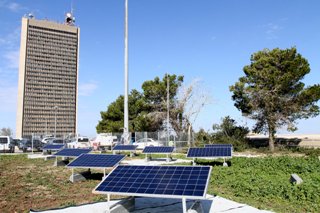Jan 29 2015
There’s plenty of cold weather still to come, but the University of Haifa is preparing for the sun, with a new study that examines whether solar electricity panels and green roofs can work well in tandem.
 Solar panels and green roofs at the University of Haifa. Credit: University of Haifa
Solar panels and green roofs at the University of Haifa. Credit: University of Haifa
The Kadas Green Roofs Ecology Research Center, headed by Prof. Leon Blaustein, researches the potential contributions of green roofs – roofs that are partially or completely covered with vegetation. With ongoing urbanization, which reduces the variety of species found in cities, green roofs can increase biological diversity, and also provide insulation, bringing energy benefits to building owners who will save money on heating and cooling.
Now the researchers, as part of a doctoral project by Bracha Schindler, are trying to add another “green” element to such roofs – solar panels that produce electricity. According to Kadas Center manager Dr. Shay Levy, the research hypothesis is that a green roof cools the panels, which will improve electricity production on hot days. The panels, meanwhile, will provide shade and greater heterogeneity, making areas of the roof habitable by a wider variety of flora and fauna.
The above study is the precursor of a larger study being planned by the Kadas Center in conjunction with the Green Knesset project being implemented by the Knesset, where solar panels will be installed on green roof plots atop the Knesset after the shemitta (sabbatical) year is over in early Fall 2015. The findings of the research project at University of Haifa will facilitate the larger research project on the rooftop of the Knesset, where the importance of irrigation on the PV-green roof synergy will also be assessed.
“We are always looking for synergy – combinations that make a total contribution that’s bigger than that of the individual components,” Dr. Levy said. “On the assumption that our hypotheses prove themselves, we hope to find a green synergy that will benefit the environment and perhaps further encourage the planting of green roofs and the installation of solar panels all over our cities.”